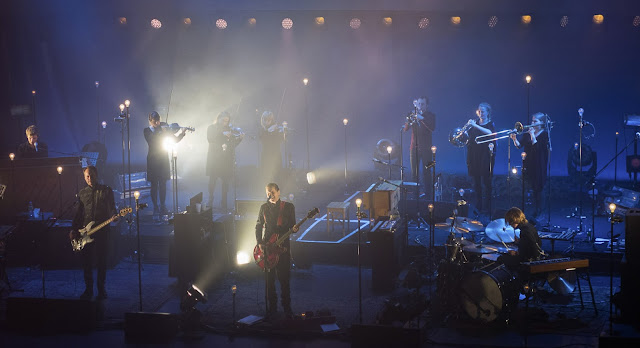My first encounter with Sigur Ros made for a remarkable evening; one I will remember for years to come. It combined a deep sense of nostalgia with amazing beauty and a sense of euphoria. Rather like JS Bach, the Reykavik band named after Jonsi Birgisson's sister Sigurros Elin is widely revered in musical circles, and I'd been waiting for over two years for an opportunity to experience them. After this, I'm exceptionally happy that I'll be seeing them again next month at Coachella, and in August at Jodrell Bank Radio Telescope in Cheshire, UK. Sigur Ros can stand not only alongside the greats of the historic musical canon, but amongst the finest of all western art.
The only two spoken words Jonsi uttered in the two hour set were 'thank-you', and in the parts of the gig where he was visible, he spent much of the time looking down whilst bowing his electric guitar. The audience was utterly silent, mesmerised, throughout, and barely moved their bodies. The lyrics were unintelligible too, sung in the invented language Volenska. There was no overt attempt to engage: It was a private experience taking place in each audience member's imagination, and thus uniquely personal. Judging by reactions of those leaving the show, and on Twitter, I was not the only person to recognise that something extremely moving and spiritual had taken place in Manchester.
The show confounded my expectations in several respects. Far from being purely introverted, it was extremely dramatic, despite the largely slow tempos, with thundering climaxes and high bass energy throughout (helped by stunning sound). It wasn't a showcase of the album Valtari (in fourth place in my albums of 2012) either: instead they delved as far back as Agaetis Byrjun and forward to three new songs, which should find their way onto the album which is currently being recorded in LA. That new material had less light and shade than I expected, at times being almost bombastic, marking a possible change of direction. The energy and stamina of the drummer Orri Páll Dýrasones was considerable though, and I was happy that the preconception that their music can be soporific was disproved.
Above all this show was theatrical. The first three songs were performed with the band behind a gauze curtain in semi darkness, accompanied by a Son et Lumière show. Initially the projections were reminiscent of the northern lights, but quickly transmuted into a forest, with giant sized shadows of Jonsi. Then finally all eleven musicians on stage were triumphantly revealed, including 3 violinists, french horn, trombone, drummers and keyboard players. The unifying theme was that amazing falestto voice, and the vast dynamic range between silence and the ear shattering was reflected in the lighting, from blackness to the blinding in the final encore Hoppipolla. To add to the drama, a large screen above the stage projected striking film images, which added to the other worldly feel.
What Jonsi has achieved here with Sigur Ros is a contemporary realisation of Wagner's Gesamtkunstwerk (total work of art) with a blending of the visual arts, theatre, and music. I'd listened to a live relay of my favourite opera Parsifal from The Met Opera this weekend, and I was struck by the similarities in the emotional impact. The two hours of this show were equal in length only to the first act of Parsifal, but the blending of extended songs without the atmosphere being interrupted in between paralleled romantic opera. Even the two encores lasted 20 minutes. More profoundly, the transformation of the theatre to an utterly absorbing fantasy world to which I was transported recalls some of my finest operatic experiences. I'm now back in the real world, but this journey, like the greatest art, has transformed me, changing my outlook long after those final resplendent notes have faded away.
Setlist
- Yfirborð
- Í Gær
- Ný Batterí
- Vaka
- Brennisteinn
- Sæglópur
- Olsen Olsen
- E-bow
- Varúð
- Hoppípolla
- Með Blóðnasir
- Glósóli
- Kveikur
- Svefn-g-englar
- Popplagið






No comments:
Post a Comment